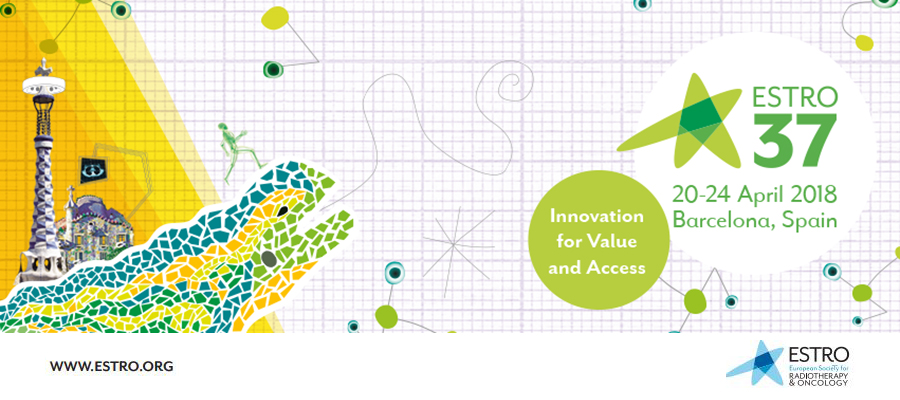EORTC and ESTRO announce a new collaboration to maximise the benefits of radiation oncology
23 Apr 2018
Barcelona, Spain: Despite being very effective and widely used, radiation oncology treatment still suffers from a lack of collective knowledge on how some treatments affects patients’ functioning, symptoms and quality of life, and how best to optimise their effectiveness. Such information is available through the outcome of clinical trials, but formal data-sharing is rather haphazard, particularly where new treatments are involved. With the advent of personalised cancer medicine, this means that patients may not always receive the most effective treatment in their particular case. In a bid to put this situation to rights, the European Organisation for the Research and Treatment of Cancer (EORTC) and the European Society for Radiotherapy and Oncology (ESTRO) have joined forces to launch a new initiative, E2-RADIatE (EORTC-ESTRO Radiation Infrastructure for Europe). The project will be presented for the first time at the ESTRO 37 conference, which starts today (Friday).
The initiative aims to put in place a pan-European infrastructure for a more efficient framework across the field of radiation oncology by encouraging collaboration that will also involve other oncology disciplines, in order to generate robust data on its role in cancer treatment and to further develop and integrate the discipline into therapeutic strategies. “We believe that, through E2-RADIatE, we will be able to improve the efficiency of research projects, both in their take-up and conduct, and offer effective pan-European models to research partners,” says EORTC President, Professor Bertrand Tombal, Chairman of the Division of Urology and Professor of Urology at the Université Catholique de Louvain (UCL), Cliniques Universitaires Saint-Luc, Brussels, Belgium.
E2-RADIatE will commence activity with two innovative projects. OligoCare will collect evidence for best practice in the treatment of oligometastases, where the primary cancer has spread (metastasised) to only a limited number of regions. Patients in this state have a good chance of survival if the metastases can be ablated, but evidence on how best to do this is lacking. Additionally, there is the problem of selecting which patient is most likely to benefit from which treatment. “These questions are unlikely to be answered within the traditional framework of prospective randomised trials because the situation of oligometastasis is diverse on so many fronts” says ESTRO President Professor Yolande Lievens, head of the department of radiation oncology at Ghent University Hospital, Belgium.
The proton therapy project aims to provide an effective data-sharing platform for particle therapy treatments. This is a rapidly developing technology with considerable potential in the treatment of cancer. But national healthcare providers face budget restrictions and, as a consequence, health technology assessment authorities are requiring more and more evidence of its effectiveness. E2-RADIatE aims to recruit all patients treated in proton therapy centres throughout Europe to provide this through, for example, a Europe-wide assessment of whether proton therapy leads to less clinical toxicity in treated patients. It is expected to be up and running in one year with approximately 2000 patients recruited in five years.
The partners believe that the outcomes of these projects, together with further initiatives to be undertaken by E2-RADIatE, will improve not only the health of patients, but also the competitiveness of EU radiation and multidisciplinary oncology. “They will create a significant critical mass that we believe will be influential at all levels of clinical research, regulation, and healthcare systems,” says EORTC Director General Dr Denis Lacombe.
Related News
Meet the new EORTC Board
9 Jul 2024
We are pleased to announce the release of the EORTC 2023 Annual Report
17 Jun 2024
Dr Denis Lacombe, EORTC CEO, appointed stakeholder co-chair of ACT EU advisory group
24 May 2024
Clinical Trials Day 2024: a Q&A on pragmatic clinical trials
20 May 2024
EORTC/EMA workshop suggests an international way forward for treatment optimisation studies
8 May 2024
EORTC’s Participation at the ESTRO Congress 2024
29 Apr 2024
EORTC: Advancing research and treatment for rare cancers
29 Feb 2024
EORTC Fellowship Programme: celebrating more than 20 years of impactful collaboration
22 Feb 2024
Appointment of Malte Peters as EORTC Strategic Alliance Officer
9 Feb 2024
Unique series of workshops in partnership with the European Medicines Agency (EMA)
7 Feb 2024


